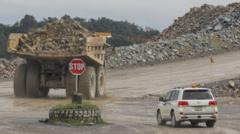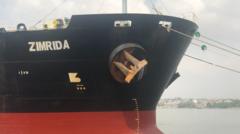The U.S. Interior Department’s recent announcement to consider a mineral extraction proposal off American Samoa has reignited discussions surrounding seabed mining, with implications that stretch from domestic industries to international law.
U.S. Moves Closer to Seabed Mining Near American Samoa

U.S. Moves Closer to Seabed Mining Near American Samoa
The Interior Department's review of seabed mining proposal ignites debate among international stakeholders.
In a significant development, the U.S. has taken a step toward the commercial exploitation of seabed resources, with the Interior Department announcing it will assess a proposal from Impossible Metals, a company based in California. This initiative follows a controversial executive order that seeks to streamline the permit process for seabed mining both within U.S. territories and in the broader international waters of the Pacific Ocean. The ocean floor of this region is reportedly home to abundant nodules containing essential metals like nickel, cobalt, and manganese, which are crucial for various high-tech applications and are currently dominated by supply chains in China.
Despite the potential benefits, there are substantial challenges associated with seabed mining, particularly concerning technological capabilities and environmental implications. Critics caution that no commercial seabed mining has occurred to date, highlighting the significant hurdles that lie ahead. Moreover, numerous countries emphasize that U.S. operations in international waters could violate a United Nations treaty designed to regulate such activities, which mandates full consensus on environmental safeguards before proceeding.
The announcement and accompanying executive order have triggered backlash from a multitude of international governments and environmental groups, who argue that overstepping these regulations undermines global efforts to establish fair mining practices and protect oceanic ecosystems. As demand for these critical minerals surges, the tension between advancing U.S. interests and adhering to international accords continues to escalate.
Despite the potential benefits, there are substantial challenges associated with seabed mining, particularly concerning technological capabilities and environmental implications. Critics caution that no commercial seabed mining has occurred to date, highlighting the significant hurdles that lie ahead. Moreover, numerous countries emphasize that U.S. operations in international waters could violate a United Nations treaty designed to regulate such activities, which mandates full consensus on environmental safeguards before proceeding.
The announcement and accompanying executive order have triggered backlash from a multitude of international governments and environmental groups, who argue that overstepping these regulations undermines global efforts to establish fair mining practices and protect oceanic ecosystems. As demand for these critical minerals surges, the tension between advancing U.S. interests and adhering to international accords continues to escalate.


















